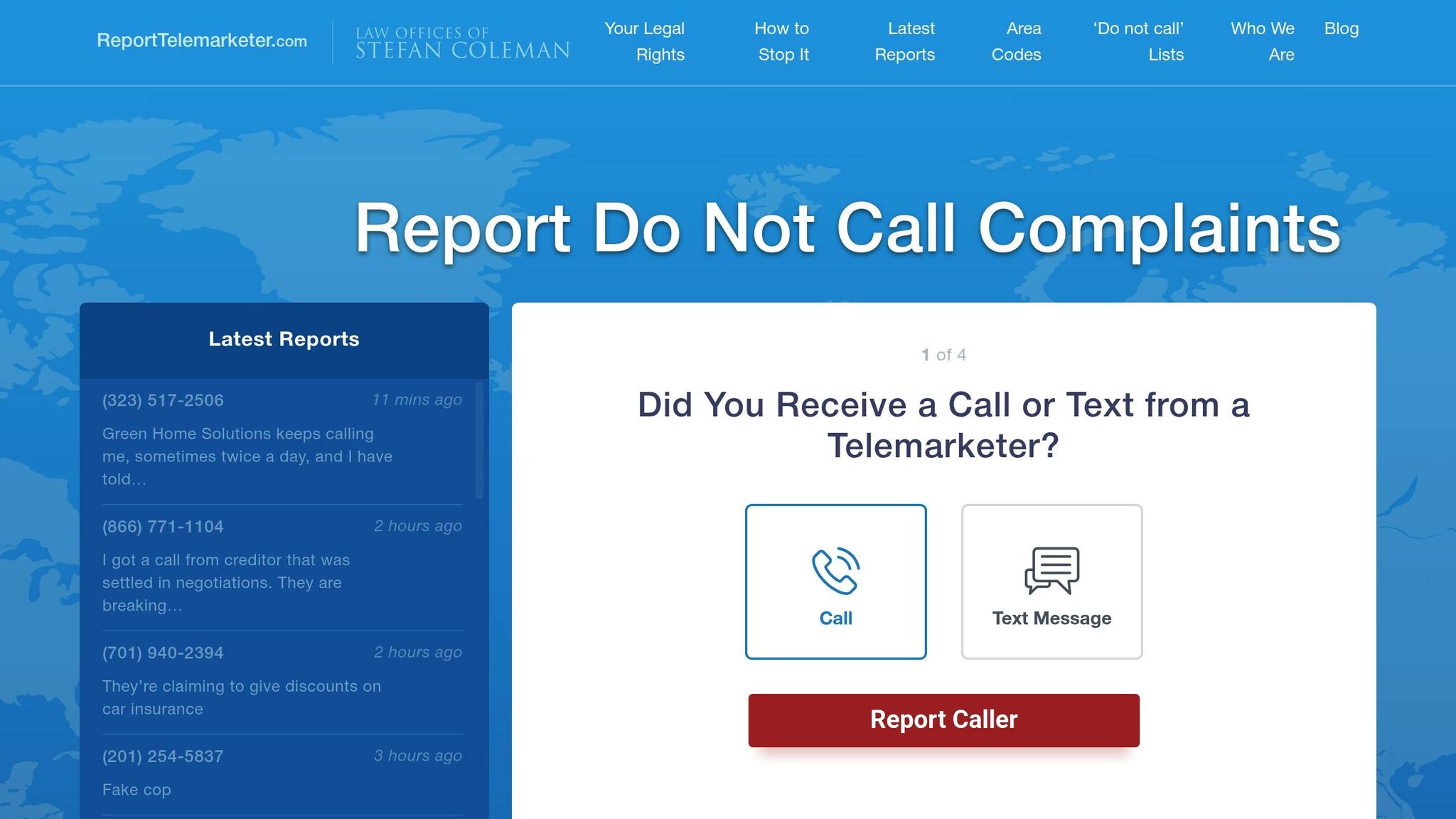
Political calls are exempt from the National Do Not Call Registry, but they must follow specific rules under the Telephone Consumer Protection Act (TCPA). Here’s what you need to know:
- Robocalls: Allowed to landlines (limited to 3 every 30 days), but require consent for mobile phones.
- Live Calls: No prior consent needed.
- Text Messages: Automated texts require consent.
Political calls are protected under the First Amendment, making them less restricted than commercial telemarketing. However, they must clearly identify the caller and follow state-specific regulations. You can block or reduce these calls using tools like AT&T Call Protect or apps like RoboKiller. Report illegal calls to the FCC or FTC if they violate TCPA rules, such as calling outside permitted hours or using fake caller IDs.
Political campaigning calls exempt from ‘Do Not Call’ list
Political Call Exemptions Explained
Political calls are exempt from Do Not Call Registry rules due to specific legal guidelines and constitutional protections.
Laws Behind the Exemption
The Telephone Consumer Protection Act (TCPA) sets different rules for political communications, separating them from commercial telemarketing calls.
Why Regulators Allow Political Calls
Political calls are protected under the First Amendment, which grants the highest level of protection to political speech. Any restriction on such speech must meet strict legal standards.
This principle was reaffirmed in 2020 when the Supreme Court, in Barr v. American Association of Political Consultants, upheld the TCPA’s restrictions on robocalls but removed an exception related to government debt collection.
Political vs. Commercial Calls
Although political campaigns have fewer limitations, they must still adhere to certain rules:
- Caller ID: Campaigns must clearly state their identity and provide contact information.
- Mobile Phones: Robocalls to cell phones require prior consent.
- State Regulations: Some states enforce additional rules, such as:
- Campaign registration requirements
- Stricter limits on calling hours
- More detailed disclosure obligations
In February 2024, the FCC prohibited the use of AI-generated voices in robocalls after incidents where fake voices mimicked public figures. This decision reflects ongoing efforts to address new concerns while respecting free speech rights.
Although political campaigns benefit from these exemptions, consumers still have ways to manage unwanted calls (explored in ‘How to Handle Political Calls’).
sbb-itb-a8d93e1
How to Handle Political Calls
Political calls can be frustrating, but you have options to manage or reduce them effectively. Here’s what you need to know.
Your Legal Rights
Political campaigns must have your explicit permission to send automated calls or texts to your mobile phone. If you’ve given consent, you can revoke it at any time to stop these communications.
Call-Blocking Tools
Phone carriers provide helpful tools to block or filter unwanted calls. Here’s what some of the major providers offer:
| Carrier | Tool Name | Features |
|---|---|---|
| AT&T | Call Protect | Identifies spam, blocks risky calls |
| Verizon | Call Filter | Custom blocking, spam detection |
| T-Mobile | Scam Shield | Blocks scams, verifies callers |
| Sprint | Call Screener | Filters unwanted calls, spam alerts |
You can also explore third-party apps for added protection. For example, RoboKiller uses audio fingerprinting and reported a 55% drop in political calls for its users during the 2020 elections. Other apps like Truecaller and Hiya provide real-time caller ID and customizable blocking options to help you handle these calls.
Steps to Reduce Calls
Here are some practical actions to cut down on political calls:
- Request Removal: Politely but firmly ask to be taken off their calling list when you receive a political call.
- Use Built-In Phone Features: Most smartphones have settings to screen or block unknown calls:
- iPhone: Go to Settings > Phone > Silence Unknown Callers.
- Android: Open the Phone app > Settings > Blocked numbers > Block unknown callers.
- Use a Secondary Number: Consider using a Google Voice number for political activities to protect your primary line.
If you suspect a call is illegal, you can file a complaint with the FCC or use services like ReportTelemarketer.com to take action. Persistent calls that ignore your requests may violate regulations – check out the section on ‘Illegal Political Call Practices’ for more information.
"The FTC reported that complaints about unwanted calls decreased by 34% from 2019 to 2020, partly due to increased use of call-blocking technologies".
Illegal Political Call Practices
Some political campaigns cross the line into illegal territory. Here’s how to spot and address these violations effectively.
Signs of Illegal Calls
Political calls violate the law when they break rules set by the Telephone Consumer Protection Act (TCPA). Look for these red flags:
| Violation | Key Indicators | Response |
|---|---|---|
| Automated Mobile Calls | Robocalls or texts sent to cell phones without prior consent | Document call details |
| Timing Violations | Calls made before 8 AM or after 9 PM | Note time and frequency |
| Spoofed/Missing IDs | Calls from fake numbers or with no caller ID | Screenshot caller ID |
| Excessive Contact | More than three robocalls to landlines within 30 days | Track call frequency |
For example, in October 2023, the FCC proposed a $5.1 million fine against a political group for making 1,141 illegal robocalls spreading false voting information.
Where to Report Violations
If you encounter illegal political calls, report them through these official channels:
- FCC Complaints Portal: Submit a complaint at fcc.gov/complaints.
- Federal Trade Commission (FTC): Use the FTC’s complaint assistant at ftccomplaintassistant.gov.
- State Attorney General: Contact your state’s consumer protection office for assistance.
Using ReportTelemarketer.com

When official reporting doesn’t resolve the issue, specialized services like ReportTelemarketer.com can help. This platform focuses on political call violations and offers services such as:
- Investigating calls for TCPA violations
- Sending cease-and-desist letters to repeat offenders
- Filing formal complaints when necessary
Their expertise in handling persistent offenders makes them a strong option for tackling ongoing issues.
Summary
Main Points
Political calls occupy a unique space in regulations. They’re exempt from Do Not Call rules but must still comply with TCPA (Telephone Consumer Protection Act) guidelines. While protected under the First Amendment, these calls are still subject to certain restrictions.
Key rules include: limits on robocalls to landlines, the need for consent when contacting mobile phones, and requirements to clearly identify the caller.
Next Steps
To take action and manage these calls effectively, focus on these steps:
- Enable call protection tools to reduce unwanted calls.
- Report illegal activity through:
- The FCC’s official complaint portal at fcc.gov/complaints
- Platforms like ReportTelemarketer.com for repeat offenders
- Your state’s Attorney General’s office for further action
- Withdraw consent immediately if you receive unauthorized mobile communications.